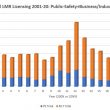LMR licensing activity shows slight increase in third quarter
LMR licensing activity continued to increase slightly in both the public-safety and business/industrial arenas during the third quarter, setting the stage for 2022 to be the first year in which both sectors register LMR licensing increases in a decade—albeit at much lower levels than 10 years ago.
Figures in the FCC Universal Licensing System (ULS) indicate that the agency could grant more than 3,200 public-safety LMR licenses for the first time since 2017, if this year’s current pace is maintained through the end of the year. In the business/industrial space, the current pace of LMR licensing reflected in the ULS database projects that less than 10,000 applications will be granted for the third consecutive year, but the year-end figure should top the totals for each of the last two years by about 400.
If both projections become reality, it will mark the first time that both public-safety and business/industrial LMR activity have increased in the same year since 2012, the year when licensing activity reached all-time high levels as LMR operators sought to comply with the FCC’s narrowbanding mandate at the end of that year.
While the simultaneous sectors increases in 2022 and 2012 provide some trending similarities in LMR licensing activity, there is a significant difference in the raw number of applications granted. In 2012, the FCC granted 40,171 LMR licenses—29,569 for the business/industrial sector and 10,602 for public safety. This year, the FCC is projected to grant slightly more than 13,000 applications for LMR licenses in the two sectors—a decrease of more than 67% when compared to the 2012 figures.
Meanwhile, the FCC has finalized its public-safety licensing figures for the past two years. In 2020—when the COVID-19 pandemic greatly impacted companies’ ability to travel—a record-low 2,763 public-safety licenses were granted. This figure increased to 3,098 in 2021, when pandemic-related restrictions continued to impact work throughout much of the year.
But industry officials like Motorola Solutions CEO Greg Brown repeatedly made public statements that most public-safety LMR projects simply were being delayed—not cancelled—noting the mission-critical nature of the systems.
This prediction appears to be coming true in 2022, as the FCC has granted 2,371 of the 2,434 public-safety LMR license applications submitted through Monday, according to the ULS database. If this pace is maintained through the end of the year and all 63 pending applications are granted, the FCC would be projected to approve 3,219 public-safety licenses in 2022.
Topping 3,200 public-safety LMR licenses would be significant, as it would be the highest total since the FCC granted 3,194 public-safety licenses in 2018. The last time the FCC granted more than 3,200 public-safety licenses was 2017, when 3,402 applications were approved, according to the ULS database.
Perhaps most impressive about this year’s public-safety licensing numbers is the fact that 1,103 of the 1,135 applications for new licenses—as opposed to modifications to existing licenses—submitted during the first three quarters of the year already have been granted. This indicates that the number of new public-safety LMR licenses will greatly exceed the totals in each of the last three years, with the 1,138 new licenses granted in 2020 being the largest total.
On the business/industrial side, the FCC has granted 6,946 of the 7,558 LMR license applications submitted this year, as of Monday. If all 612 pending applications were approved and this year’s activity pacing is maintained, the FCC is projected to grant 9,995 business/industrial LMR licenses by the end of the year. Not all pending applications will be granted, but the 2022 total for the sector still should easily eclipse the 9,446 applications approved in 2020 and the 9,423 granted in 2021.
While the business/industrial sector appears ready to end a three-year streak of declining LMR licensing activity, the 2022 total likely be the third consecutive year in which the sector has failed to have 10,000 LMR licenses granted. It also would mark the sixth consecutive year of the FCC granting less than 11,000 business/industrial licenses—a threshold exceeded in each of the first 16 years of the FCC’s online ULS database.















